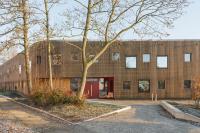Steinweid Apartment Buildings
Kilchberg
With generous floorplans and high-quality materials, the residential development in the Lake Zurich town of Kilchberg translates the typology of upper middle-class housing from the early twentieth century into a contemporary idiom. The composition of the buildings, their volumes, as well as the materialisation refer to Mies van der Rohe’s Lange House.
–
Single-family houses and small apartment buildings with generously sized green spaces shape the pattern of development in Kilchberg on the left shore of Lake Zurich, just a few kilometres from the centre of Zurich. The existing development plan is strongly oriented on these local qualities and on the undulating character of site. On the predefined plots there are restrictions on building heights.
The four congruent octagonal buildings, swivelled in relation to each other, are arranged along the curve made by Steinweidstrasse. On the street side the volumes can read as a reminiscence of a two-storey villa. On the garden site, the downward sloping sites presented an opportunity to make three storeys. The upper levels of the buildings offer views that extend as far as the Glarner Alps in the south and the city of Zurich and the Uetliberg to the north-west.
The way in which each of the four volumes is deliberately swivelled at an angle to the gently curving street creates a dynamic rhythm and allows a clear address to be formed. Subtle bends in the facades lend the volumes elegance, from the spacious apartments visual relationships are offered that extend far into the landscape. Although they are spatial close to each other, the way the buildings are stepped relaxes the existing density.
The perforated parapets of the rooftop terraces and the large window openings horizontally articulate the side facing towards the valley. The sensitively designed gardens lend support to the atmosphere of a cultivated and generous way of living. The buildings refer to their surroundings with their floorplan typology, too: a wide entrance hall and papered walls edged with a wooden strip are just as important as the classic hallway with visual axes to the daytime space and into the garden area.
The fired brick used externally refers to the local building ground that contains clay. At the same time, the high-quality clinker brickwork in warm shades of red and brown recalls the Gründerzeit era and is a sign of built permanence and quality.
https://www.fischer-architekten.ch/en/projects/steinweid-apartment-buildings-kilchberg
- Architects
- Fischer Architekten AG
- Location
- Steinweidstrasse, 8022 Kilchberg
- Year
- 2018
- Client
- Meili Unternehmungen AG
Related Projects
Magazine
-
Gutes Bauen OstschweizUmbauSakralbautenBauen für die Gemeinschaft
Der Tisch als Sinnbild für Gemeinschaft
Rahel Lämmler | 25.04.2025 -
StädtebauBau der WocheHolzbauBildungsbauten
Hindernisse beflügeln den Erfindergeist
Ludloff Ludloff Architekten | 25.04.2025















